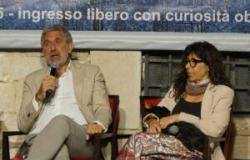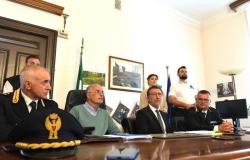Saturday 1 June 2024 – Focus
Zavattini, Amidei, Guerra, Age&Scarpelli, Sonego, Maccari, Scola. They are screenwriters (Scola later became a great director). They are the ones who write the stories that the directors then turn into films. The names mentioned acted at the highest level, the directors were the masters of the golden eras of our cinema. Those films told about Italy, in its history, in its feelings, in its pains and in its hopes, with great clarity and effectiveness. Then there was non-fiction and noble literature, but to have an immediate perception of what was happening, you rely on those authors and those films and you understand everything.
Age&Scarpelli, Luigi Comencini and Alberto Sordi, in Everybody at hometell the story of the armistice of 8 September 1943, the “Badoglio Proclamation”, when the Germans went from allies to enemies overnight and the Italian army fell apart, better than the written accounts of the time.
The painting that bike thieves (watch the video review), (Zavattini-De Sica) made cinema history in the post-war period. There are people’s faces full of bewilderment and fear of the future, there is no work, there is a queue for bread. A car passes through the streets every five minutes. Families take their stuff to the pawnshop.
Amidei – and other screenwriters – and Rossellini give a snapshot of Italy during the war, through events that go up the peninsula: Sicily, Rome, Naples, Florence, the Emilian Apennines and the Veneto. You realize what happened then. You understand everything. And you will remember it.
But the champion of those films is certainly A difficult lifefrom 1961, written by Rodolfo Sonego, directed by Dino Risi.
Silvio (Alberto Sordi) is a communist partisan who fought in the Lake Como area, where he met Elena (Lea Massari) and took her to Rome where she worked in a small newspaper financed by a cooperative. Life is, indeed, difficult, there are days when you skip meals. It’s the evening of the referendum, the city is in excitement, people have poured into the streets, where they discuss and argue with passion. The first news arrives, what we now call exit polls: “good” according to Silvio, “the “red” cities like Florence and Bologna, the south uncertain”. Elena is waiting for her partner to manage to get dinner in a restaurant and she is greeted by an elegant gentleman, a family friend, a marquis. Silvio has not succeeded in his aim, Elena introduces him to the marquis, who invites the two to dinner in the palace of the Rustichelli princes. The invitation has a precise reason, the princes would be thirteen and table and… it just doesn’t work.
It must be said that A difficult life it is one of the greatest Italian films ever, a pearl of that golden age of Comedy. Risi describes the environment of that nobility like no one else. At this point, the narrative needs nothing more than copy-paste.
GO TO THE FILM TAB CONTINUE READING
Risi and Sonego tell the story. The ninety-year-old princess, almost dying but authoritative, sits at the head of the table and observes the new arrivals, she realizes that they are not part of her world and she does not approve. The others are children, grandchildren and great-grandchildren. A general cannot be missing who tells, emotionally, of a meeting he had, in Pinerolo, with King Vittorio Emanuele who greeted his unit leaving for Africa.
The princess says “I’m so worried about him” then asks, looking straight at Silvio, “why do so many people hate the king?” Silvio replies “Why do many accuse him of having gone to the south, why didn’t he go to the north to fight with him in the partisans?” The general replies “You said gone, but with your hand you made a sign “ran away”. The Savoys don’t run away.” Elena, cautious, tries to mediate “What was he doing, he was fighting at seventy years old, small, a little sick.” A young nephew bursts in. “The partisans… scoundrels who have done nothing but confusion.” Someone applauds, in the meantime dinner is served, a very rich mess. The princess serves a single olive. Elena fills Silvio’s plate, and hers, to the brim. But here’s the moment of the radio announcement. “Let’s read the official statement of the referendum between monarchy and republic”. Silence fell: monarchy, 10 million 709 thousand 423. The nobles rejoice. “republic, 12 million 718 thousand 019. From today Italy is republican.” Death descends on the environment. After a few moments of confusion everyone gets up. The Marquis who made the invitation speaks on the phone. “Don’t cry dad, all is not lost.” The room and the table are empty, but Elena and Silvio, happy and hungry, begin to eat. While the radio broadcasts the Mameli anthem at full volume.
The referendum of 2 June 1946 was this. It couldn’t have been told better than this.





